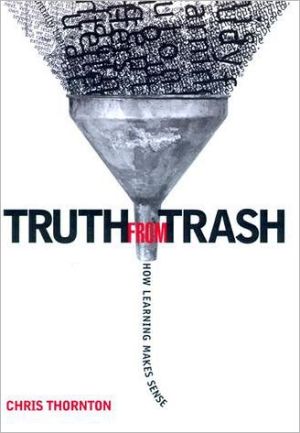

 |

|

Sold Out
Book Categories |
Preface
1 The Machine That Could Learn Anything
1.1 Back to Reality
1.2 Prediction Games
1.3 Supervised Learning
1.4 Concept and Classification Learning
1.5 Behavior Learning
1.6 Financial Prediction
1.7 Learning Problems to Solve by Hand
1.8 A Reasonable Learning Criterion
1.9 Note
2 Consider Thy Neighbor
2.1 Similarity and the Nearest-Neighbor Method
2.2 Nearest-Neighbors in Picture Form
2.3 Measuring Similarity and Distance
2.4 Using 1-NN to Predict the Voting Behavior of Politicians
2.5 General Performance of 1-NN Learning
2.6 Warehouse Security Example: Eliminating False Alarms
2.7 Notes
3 Kepler on Mars
3.1 Science as Communal Learning
3.2 Puzzling Under the Night Sky
3.3 Kepler's Vital Statistics
3.4 The Mysterium Cosmographicum
3.5 Kepler and Tycho Brahe
3.6 Getting It Right for the Wrong Reasons
3.7 A Footnote on Neptune
3.8 Lessons from Kepler
3.9 Notes
4 The Information Chicane
4.1 Information Theory: Starter Pack
4.2 Uncertainty
4.3 Redundancy
4.4 Information in Bits
4.5 Using Redundancy to Combat Noise
4.6 Regularity as Useful Redundancy
4.7 Notes
5 Fence-and-Fill Learning
5.1 k-Means Clustering
5.2 On-line k-means Clustering (Competitive Learning)
5.3 Fence-and-Fill Learning
5.4 Perception Learning
5.5 Backpropagation and the Multilayer Perception
5.6 Radial-Basis Functions
5.7 ID3 and C4.5
5.8 The Naive Bayes Classifier
5.9 Centre Splitting
5.10 Boundaries of the Fence-and-Fill Class
5.11 Warehouse Security Example (Continued): 24-Hour Crisis
5.12 Notes
6 Turing and the Submarines
6.1 Moonlight Sonata
6.2 From Encryption toDecryption
6.3 Encryption Using Keys
6.4 Decryption Issues
6.5 Public-Key Encryption and the RSA Method
6.6 The Origins of Enigma
6.7 Building Bombes
6.8 Encryption and Learning
6.9 Notes
7 The Relational Gulf
7.1 A Meeting at the Crown
7.2 Factor X: The Real Enigma
7.3 The Explicitness Distinction
7.4 Nonrelational Learning Is Similarity-Based Learning
7.5 Incidental Effects
7.6 Geometric Separability
7.7 Alignment and Salience
7.8 Sensation Entropy
7.9 Notes
8 The Supercharged Learner
8.1 The Relational/Nonrelational Continuum
8.2 Sneaky Problems
8.3 Supercharging
8.4 The Need for Relational Partitions
8.5 Pick-and-Mix Learning and Kepler's Third Law
8.6 FOIL
8.7 Relational Dilemma
8.8 Warehouse Security Example--Third Installment
8.9 Notes
9 David Hume and the Crash of '87
9.1 Ride a White Swan
9.2 The Problem with Science
9.3 Recovering from Hume's Crash
9.4 Scandalous Philosophers
9.5 Abolition of the Free Lunch
9.6 Escape Clause
9.7 Notes
10 Phases of Compression
10.1 Through a Double Slit Darkly
10.2 Induction--Compression Duality
10.3 Data Compression
10.4 Sequence Encoding and Ziv-Lempel Compression
10.5 Kolmogorov Complexity and the (Mythical) Perfect Compressor
10.6 Randomness
10.7 Minimum Description Length
10.8 Compression Phases
10.9 Hume Slashed by Occam's Razor
10.10 Notes
11 Protorepresentational Learning
11.1 The Cincinnati Story
11.2 Relational Learning Revisited
11.3 Truth from Trash
11.4 Why TFT Is Not Just Supercharged Fence-and-Fill
11.5 From Virtual Sensors to Symbol Processing
11.6 SCIL Learning--a Simple TFT Approach
11.7 SCIL Learning in the Warehouse Domain
11.8 Representational Implications
11.9 Is TFT Nouvelle or Classical?
11.10 Notes
12 The Creativity Continuum
12.1 Cincinnati Postscript
12.2 Crash Landing at Gatwick
12.3 Demise of the Career Scientist
12.4 Stop Press
12.5 Notes
References
Index
Login|Complaints|Blog|Games|Digital Media|Souls|Obituary|Contact Us|FAQ
CAN'T FIND WHAT YOU'RE LOOKING FOR? CLICK HERE!!! X
 You must be logged in to add to WishlistX
 This item is in your Wish ListX
 This item is in your CollectionTruth from Trash: How Learning Makes Sense
X
 This Item is in Your InventoryTruth from Trash: How Learning Makes Sense
X
 You must be logged in to review the productsX
 X
 X

Add Truth from Trash: How Learning Makes Sense, This study of learning in autonomous agents offers a bracing intellectual adventure. Chris Thornton makes the compelling claim that learning is not a passive discovery operation but an active process involving creativity on the part of the learner. Althou, Truth from Trash: How Learning Makes Sense to the inventory that you are selling on WonderClubX
 X

Add Truth from Trash: How Learning Makes Sense, This study of learning in autonomous agents offers a bracing intellectual adventure. Chris Thornton makes the compelling claim that learning is not a passive discovery operation but an active process involving creativity on the part of the learner. Althou, Truth from Trash: How Learning Makes Sense to your collection on WonderClub |